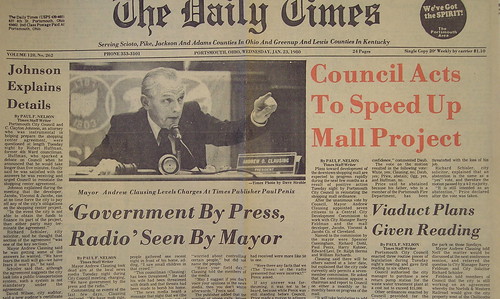






Our anorexic local newspaper, the Portsmouth Daily Times, recently announced that because of shrinking revenues from advertisers it will no longer publish on Mondays. It will shrink from a seven-day to a six-day newspaper. Though it was not mentioned in the public statement, shrinking circulation probably factored into the equation. The paper claims a circulation of about 12,000, but someone who worked at the paper said PDT routinely inflates circulation. Truth, whether in regard to circulation or local politics, is not the PDT’s strong suit.
Over the last half century, because of shrinking circulation, the PDT has been decreasing in pages and increasing in price. On January 1, 1960, the paper contained 34 pages and sold for 7 cents. On January 1, 1970, it contained 38 pages and sold for 10 cents. On January 1, 1980, it contained 18 pages and sold for 20 cents. On January 1, 1990, it contained 16 pages and sold for 30 cents. On January 1, 2000, it contained 16 pages and sold for 50 cents. As of January 1, 2009, it contained 16 pages and sold for 50 cents. Even allowing for inflation, the cost per page to the reader has gone upward steadily with the passing years. A single page of the paper now costs the reader who gets it from a machine about fifteen times as much (ouch!) as in 1960.
The shrinkage in the number of pages and the cost per capita per reader reflects, in part, the shrinkage in Portsmouth’s population over the last century. In 1907, the city’s population was approximately 50,000; in 1950, it was approximately 35,000; in 2000, it was 20,909. In 2005, it had slipped, in one estimate, to 19,072. The 2010 census will probably show a further decrease. . The decline in Portsmouth’s population reflected the decline of heavy industry in the U.S. and in the Midwest in particular. The decline was what could be expected in an American Rust Belt city, and then some.
Shrinking in Influence and Moral Stature
Though it is not as easy to measure, there are some statistics to suggest that the Portsmouth Times has shrunk in terms of influence and moral stature in the community since it was founded in 1861 by twenty-one-year-old James W, Newman. According to Nelson Evan’s A History of Scioto County (1903), the Portsmouth Times, with Newman as owner and editor, “early became prosperous and attained a wide influence and prosperity.” Under a new ownership, it became a daily in 1894. “So far as circulation was concerned,” according to Evans, “the Daily Times bounded into almost instantaneous popularity.” Its success was all the more impressive because the paper was Democratic in its political sympathies though Portsmouth was staunchly Republican. That changed in the twentieth century, of course, with the paper becoming rabidly right wing.
With the formation in 1962 of what later became the Southern Ohio Growth Partnership, the instrument was created by which a handful of men, largely Republicans, were able to control the shrinking and decaying city economically and politically. Through pork and government monies, and Foundation finagling, they learned how to make poverty pay. A culture of dependency replaced a culture of enterprise and competition. City government was corrupted and city officials became puppets. Portsmouth became a a company town but without the company. Because the PDT became the mouthpiece of the Southern Ohio Growth Partnership, and the lawyers and developers who dominated it, the PDT’s name became mud with many citizens. Most newspapers are now experiencing extreme financial problems and a number are on the verge or already have folded, but the PDT has an additional problem. It has earned the enmity of a number of Portsmouth citizens who believe it is biased in its reporting and subservient editorially to the lawyers and developers who control the economic and political life of the city. Some of those critics of the PDT had this to say when I asked them for their reaction to the Monday cutback. “Given the nature of that rag, will it really matter?” “Maybe they should take some lessons from the Cleveland or Akron newspapers and do some real investigative reporting, but then they would lose all their crony advertisers!”“Maybe they should just make it a weekend paper, that way it will at least have more than 6 pages.” “I do not waste my fifty cents on it, so I won’t miss it anyway!” “Speak the truth and the truth will set you free.”
The First Rule
In the first forty years of its existence, the Times, as a weekly and daily, had only three editors. The turnover among editors and reporters has been high in the twenty years I’ve been in Portsmouth. Maybe I’m being naïve, but I thought the high turnover was not just because of the low pay but because anybody with any self-respect, not to mention journalistic ethics, would get out as soon as they could, because if they stayed around for very long, they would end up getting fired, as two veteran reporters, Mike Deaterla and Jeff Barron, were last year. Not given to investigative reporting or liberal opinions. Barron was fired for making the mistake of mentioning that somebody arrested for dealing drugs was employed as a mechanic at Glockner Motors. A PDT reporter must never ever report anything that might embarrass a bigwig or a business that advertises in the PDT. That is a rule that should be hanging on the wall of the press room on 5th St. I didn’t think an editor could have been any more obliging to the SOGP than Arthur Kuhn was, but after he was fired not too long ago he was replaced by Jason Lovins, who has shown there were depths of casuistry and deceit that Kuhn apparently would or could not sink to.
It Pays Not to Advertise
Speaking of shrinking influence, it may pay to advertise, but not in the PDT. Look at what Jim Kalb’s ludicrous thousands-of-tiny words full-page ad in the May 3 PDT got him in the May 5 primary election. He lost by more than a 2 to 1 margin to a newcomer, Jane Murray, who ran no ad in the PDT, not even a teensy-weensy one. Kalb came out first in only one of the city’s twenty-four precincts; she won in twenty-two of them. Kalb had learned nothing from city solicitor David Kuhn who in 2007 spent thousands of dollars in PDT ads, including a quarter-page ad in which he boasted that he had the support of such local luminaries as Mike Mearan and Clay Johnson! Kuhn was clobbered in the election.
In influencing voters and swaying public opinion, an ad in the PDT is about as effective as an editorial in the PDT. Whatever position the PDT takes, the public opposes in the voting booth. I hope before much more time goes by that the shrinking PDT will completely disappear. The disappearance of the shrinking PDT will represent a step forward, not a step back for the city. I call it the Prostitute Daily Times. I look forward to the day when there are no prostitutes or PDT dispensers on the street corners of Portsmouth.



